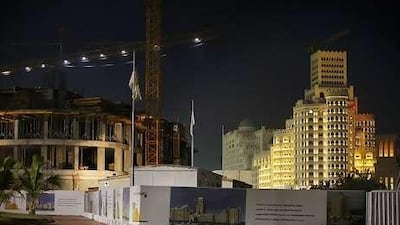Ras al Khaimah is looking inwards for opportunities to attract foreign investment as it pulls back from overseas projects. The northern emirate, which has some of the UAE's most striking natural scenery, is now counting heavily on globe-trotting tourists to raise its profile on the world stage. Last week it unveiled a joint venture with an Indian group to develop a huge theme park complex called WOW RAK.
"We wanted to bring something extraordinary to Ras al Khaimah," said Balwant Singh, the managing director of the developer Polo RAK Amusements. The joint venture between India's Polo Amusement Park and Ras Al Khaimah Investment Authority (RAKIA) is the public vanguard of a major strategic shift by Sheikh Saud bin Saqr, Crown Prince and Deputy Ruler of Ras al Khaimah. His new plan is to channel Ras al Khaimah's (RAK) financial resources into domestic development in a bid to raise the country's international cachet towards that of Abu Dhabi or Dubai. "We're trying to make Ras al Khaimah a success," he said last week.
The WOW RAK announcement was accompanied by signs that the new strategy may also entail retrenchment from RAK's international projects, which are concentrated in frontier markets such as the Caucasus states, Indonesia and central Africa. "His Highness has given us instruction not to invest overseas any more and to concentrate on Ras al Khaimah," said Khater Massaad, the chief executive of RAKIA, the emirate's sovereign wealth fund.
RAKIA plans an initial public offering (IPO) next year of shares in its port of Poti project in Georgia. "We will go for an IPO definitely in 2011," Mr Massaad said. The offering would dilute RAKIA's ownership of the Black Sea's busiest port, from which Central Asian crude is shipped to the Mediterranean. On its website, RAKIA describes the port as the "crown jewel" of its transport holdings. Two years ago, RAKIA also had "ambitious plans to set up a port and a shipyard in India". In October, 2008, it signed a memorandum of understanding with Andhra Pradesh state to develop a US$5 billion (Dh18.35bn) economic centre for the coastal city of Hyderabad but Indian sources say no feasibility report has been filed.
"The partnership with the Andhra Pradesh government for the development of the Hyderabad Economic City is in line with RAKIA's strategy to fortify its portfolio of global investments," Mr Massaad said in 2008. "India's fast-growing economy has opened a wide range of business opportunities and we intend to build on this momentum to further expand our activities in the country and across the region."
RAKIA also offered to buy 60 per cent of a defunct Congolese airline in 2008 but the deal fell through. The Poti port remains of strategic significance as the northern terminal of a putative trade corridor from the Gulf to the Black Sea. Last year, however, cargo flow through Poti shrank by 47 per cent following a brief war in August 2008 between Georgia and Russia and the onset of the global downturn. The port's revenue expressed in dollars also fell.
Other political developments have dimmed hopes for the transport corridor. Georgia's continued rocky relations with Russia means its border with Armenia, where RAK holds mining concessions, can close unpredictably. International sanctions against Iran also hamper trade between the UAE and the Caucasus. Georgia's war and wider Caucasus political instability may have shown RAK the perils of frontier markets.
The emirate is also deferring investment in a coal mining, aluminium smelting and railway complex in Indonesia, as it cools on a domestic coal-fired power project. The first phase of investment may not include a significant contribution from MEC Coal, a RAKIA joint venture with India's Trimex Minerals, according to its chief executive. Meanwhile, RAKIA is seeking to turn RAK into a manufacturing centre for cars and vehicle parts. "We have companies from Japan and now we are talking to European countries" as potential investors, Mr Massaad said.
* with additional reporting by Rebecca Bundhun and Chris Stanton tcarlisle@thenational.ae

